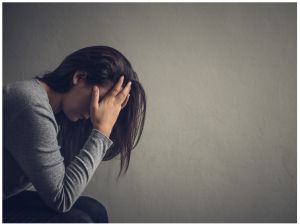
Depression is a mental health issue, and it is not a normal consequence of aging. It is common, but it is not normal. And it’s important for all of us to know that the prevalence, meaning how many people in this group experiencing anywhere from one to 50%, probably on the higher end, depending on the studies on how to measure it, and what it can also be due to. So going from working to retirement, losing a spouse, losing a child, all those things are really can impact depression.
So, there are some differences in terms of whether someone develops early onset or late onset depression. Early onset can mean that someone gets depression before they reach dull age. So this is someone who may have episodic or chronic or recurrent depression. And then there’s a subset of people that for the first time they’re experiencing depression later in life. And that is a different sort of thing that we’re dealing with. So again, important to know that this is something we could be seeing. What’s happening with, or what happens with depression in older adults is that it is very challenging to diagnose, to recognize there are many medical problems that can appear very similarly. For example, someone could have untreated thyroid disease and it could manifest as depression. And then there’s medication side effects that can overlap. You could be feeling tired, you could be feeling run down, and those could be medications.
So, it can be really tricky for clinicians or patients to really figure out what’s going on. And then lastly, I think we’ve, I would assume many of you have gone to the doctor and realize that unfortunately all, all clinicians are strapped for time and you’re running around. And so there may not always feel like there’s enough time to talk about this. And sadly, there’s still a lot of stigma around mental health and the ability to talk about this. Other things that we see in older adults is that some older adults who are experiencing depression, they may not experience the typical symptoms, but instead they have a lot of somatic or what we would call physical complaints. It could be pac pain, it could be stomach pain, it could be vague things that actually are manifestation of depression. So that’s something that can be tricky.
Other things that may be that you’re getting as a consequence of this, you’re getting standard medical therapy and you just start getting better. And it could be a sign that there’s some untreated depression there are other things that can happen less commonly, but still there is memory problems, is actually being a sign of depression. There’s some very interesting research looking at depression potentially as a prodrome or a, you know, kind of a precursor to dementia. So some interesting work being done there, and we’re still trying to tease this out. And lastly, there are some types of depression, which present with psychosis meaning delusion. So, someone who’s really just believing things that aren’t there, seeing things, just disordered thinking. And that can be a sign of depression. So, some very interesting things that happen there and hard to tease out.

So, who’s at risk for depression?
So certain medical illnesses are a huge risk. For example, stroke. Post-Stroke is a very, very high risk period. Same thing with heart, heart attacks and then other illnesses that you wouldn’t normally think about. So diabetes, cancer, and then Alzheimer’s. Dementia again is something where we’re seeing some coexisting depression and whether one is leading to the other, how they’re interrelated. That’s something we’re trying to figure out. Risk factors for late onset depression. So being female, unfortunately we have a greater risk being isolated, and this is where we’ll get a little bit into the isolation issue. Marital status can have an impact, lower economic status, uncontrolled pain. So this is something we see a lot. Uncontrolled pain and, and depression, insomnia, and then other evidence of memory impairments. Great question. Comorbid means two things. Two illnesses affecting someone are more than one illness affecting someone.
So, the conclusion about depression is that it is actually pretty common in older adults. It can be undertreated and sometimes hard to recognize and it can be hard to talk about in the doctor’s office, but there can actually be effective treatment


